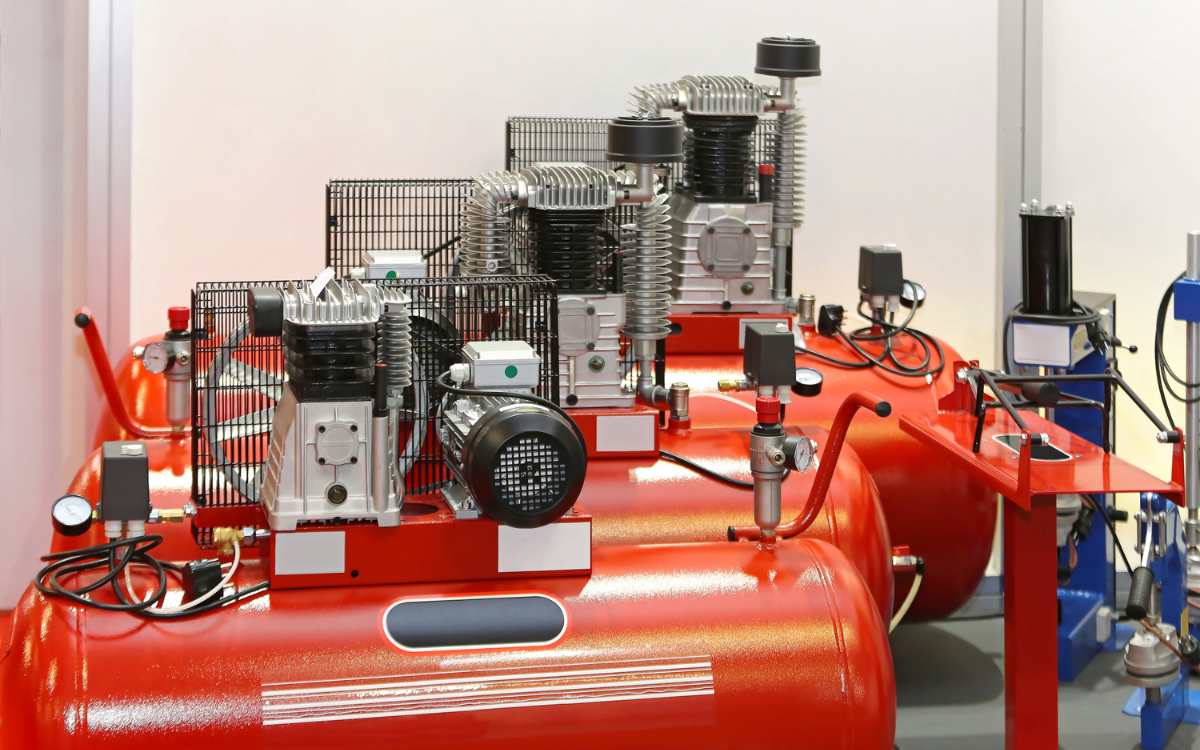One of the most important piece of machinery in an auto body shop is the air compressor machine. It’s that important because it’s the source of power for most of the tools used in the workshop, such as sanders, grinders, sand blasters, air hammers, impact wrenches and so on.
Apart from auto body work, craftsmen like woodworkers use air compressors for powering pneumatic tools like framing nailers, and even homeowners use it to fill up tires and other inflatables around the home.
If you’ve never used one before, choosing a new air compressor can be quite challenging because there’re many options out there and there’re many factors to consider such as the tank size, pressure requirements of the tools you want to power, air flow rate, power source and even noise.
You also have to consider whether you’ll go for an oil-free unit or an oiled-lubricated one.
That is why I’ve written this guide to help you choose the right one for your projects.
Our Top Picks
Metabo HPT EC914S | Stealth SAQ-12018 | Quincy QT-54 |
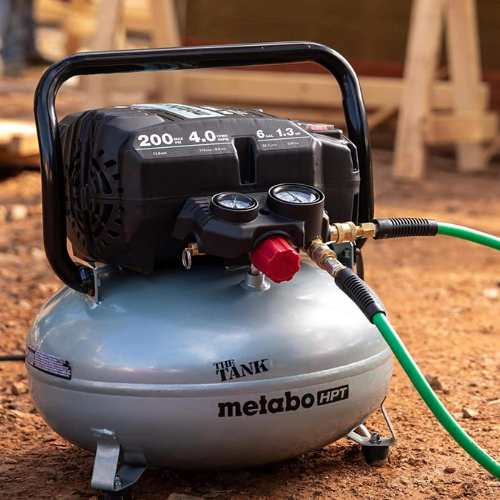 | 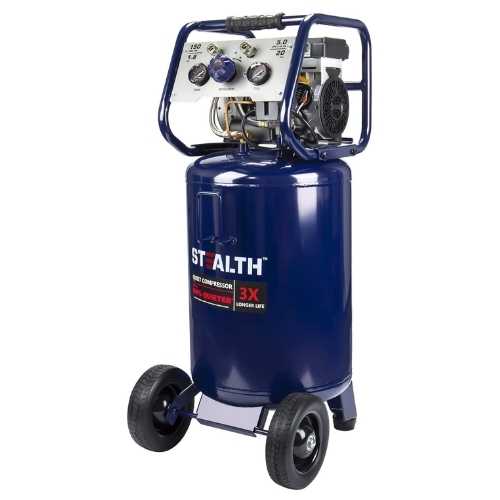 | 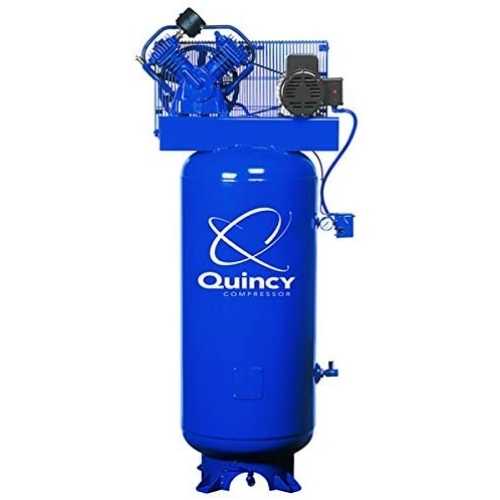 |
Best Portable Unit | Best Mid-Size | Best Stationary |
|
|
|
Table of Contents
How To Choose The Right Air Compressor For Your Projects
Here’s what you should consider.
What are you using it for?
To choose the best air compressor that will fit your needs, you have to be honest with yourself and answer the question. What am I going to use the air compressor for and how often will I be using it?
Answering this question correctly and honestly will help you avoid speculation, and aid you to know exactly what you need.
There are two type of air compressor users. Those that need it to just fill up tires, football and some other stuff around the home and will only be using it occasionally, and those that will be using it frequently to power air tools or pneumatic tools in their garage or in the jobsite.
If you’re in the first group, then you don’t need a large compressor. What you need is a small pancake or a small hotdog unit.
On the other hand, if you need an air compressor to power pneumatic tools like impact wrenches, die grinders or even a sandblaster, then you need a larger unit with a bigger tank that has the ability to store more air and produce more CFM continuously. CFM stands for Cubic Feet Per Minute. In literal terms, it stands for the volume of air a compressor can produce per minute.
Air tools or pneumatic tools consume a lot of air, so you need a bigger unit with a bigger pump, a bigger motor and a bigger tank to store the compressed air. How large you go depends on the particular tools you’ll be running and the CFM requirements of the tools.
So, the rule of thumb is check the CFM of all the tools you’ll be running with the air compressor. Add them all up, and add 30 percent to the number you get. That will tell you the CFM of the air compressor you need to buy.
If you have a car shop or a garage for working on cars, one thing I know for sure is that there’s no limit to the size of compressor you’ll need. Go for as large as your money can buy.
Good tools normally pay for themselves quickly as time goes by.
Power Source
Once you know the size of compressor you need, the second issue you need to be concerned about is the power or electricity requirements.
Air compressors don’t work themselves. Some make use of gas, but most make use of electricity. You need to plug your compressor to a power outlet for it to work.
The standard voltage in the power outlets in your home or garage will most likely be 120 Volts. That is the kind of voltage that powers single stage units with 30 gallon or less storage tank.
If you will be using your air compressor frequently, you may want to call a certified electrician to create a dedicated 120 volts power outlet for it in your workshop.
It is not advisable to run it with the same electric circuit as the one you are using in your home.
Most units larger than 30 gallons can only be powered with 240V electricity. So when shopping for a compressor, make sure to check the power ratings so you know what you’re getting and be prepared on how to power it.
Noise
Air compressors make lots of noise, especially oil-free single stage units. Hence if you going to get one, you need to also consider how to muffle the noise so that you don’t disturb your neighbors with it.
You might also consider shopping for an oiled unit instead of an oil-free one. Oiled compressors makes less noise when compared to an oil-free units.
Try to also consider the space in your garage where you’ll store it. Larger compressors make more noise, so make sure you have enough space in your garage so that the noise can be muffled a bit.
Portability
Depending on the kind of application or the kind of project you want to undertake, you might a very portable unit.
Your project might demand that you move it from one place to the other. Example includes when you are using it on a job site for framing a building, or installing trim moldings in different rooms in a building.
You don’t need a very big unit for these kind of applications, you need a portable air compressor. Generally, it’s portable if it got wheels on it.
A 20 or 30 gallon unit that got wheels on it like the Industrial Air IL1682066.MN and the DeWalt DXCMPA1982054 are very portable options you can go for. They have wheels and pneumatic tires on them. Hence, they are ideal for jobsite use, because you can easily move them from one part of the jobsite to the other.
The larger an air compressor is, the less portable it becomes. So, if you are going for a very large unit like a 60 or 80 gallon unit, then you have to give up on portability. Those are usually bolted to the ground and are best for workshop use.
Smaller ones like 3, 6, or 10 gallon compressors are very portable, because they’ve got handles on them that will allow you to take them wherever you want.
With that out of the way, here are the best air compressors I reviewed from the list 1 gallon tank size to huge 60 gallon units.
1. SENCO PC1010 1 Gallon Air compressor – Most Compact Unit
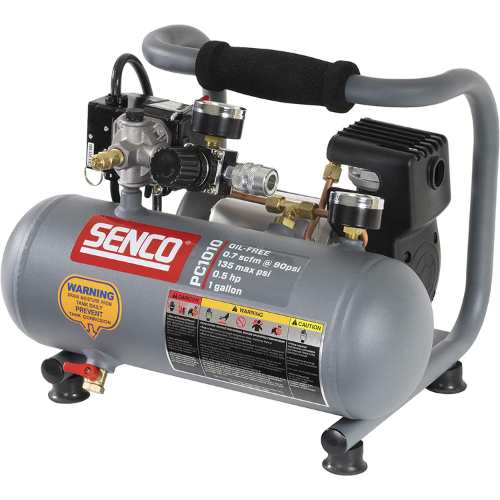
A 1 gallon air compressor unit like this SENCO PC1010 might not seem like much when you take a first look at it, but it’s exactly what’s needed for certain projects.
Sometimes, you need something small and portable you can carry with one hand and can take out there with you on the job to carry out small renovation projects or repairs. That’s what you get with this SENCO PC1010.
It’s a small air compressor unit, but it’s powerful and fills up the 1 gallon tank quickly. Although it’s about 1/2 horsepower when being used, it peaks at 1 horsepower when idle.
If you want to operate low air consumption pneumatic tools like staplers, finish nailers and airbrushes, this SENCO PC1010 will work just fine.
One more thing I like about it is that because the motor and pump and small, it doesn’t generate a lot of noise. So, you can run this inside a clients house even with the homeowner around and they’ll not be disturbed.
Here are the specs:
Tanks Size: 1 Gallon, Running Horsepower: 1/2 HP, Max Pressure: 125 PSI, CFM: 1.4, Lubrication: Oil-free, Weight: 20 lbs.
What I Like About It
Cons
It’s only for light-duty work. It’s not suitable for air-demanding tools like framing nailers and impact wrenches.
2. Milwaukee 2840-20 M18 Fuel 2 Gallon Air Compressor – Best Cordless
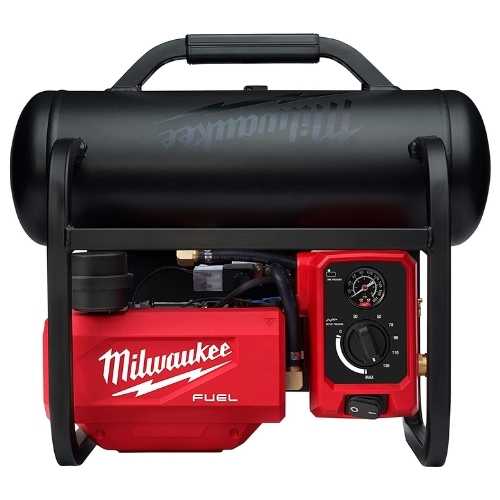
A 2 gallon air compressor might not mean much in terms of size, but if you’re a professional carpenter or home remodeler who needs it to power simple air tools like nailers and maybe inflating of car tires, then this Milwaukee model 2840-20 might just be your best bet.
The coolest thing about it is that it’s cordless, powered by Milwaukee’s M18 REDLITHIUM batteries. This will allow you to use it even without access to power outlets as long as the battery is charged.
It also means if you already use Milwaukee’s M18 batteries, you can use the same batteries to power this unit, hence you don’t have to buy spare batteries.
With the Milwaukee 2840-20, a fully charged M18 battery gives enough runtime to fire up to 1600 nails before it runs down.
Given its small and compact size, you’d expect it to run quietly more than the bigger ones, which it does, producing just 68 decibels of noise.
The small low profile design also makes it very easy to store when not in use and makes it very portable to transport on, around and off the jobsite.
Here are the specs:
Gallon Size: 2, Power Source: Battery, Max Pressure: 135 PSI, CFM @90 PSI: 1.2, Lubrication Type: Oil-free, Weight: 31.25 lbs.
What I Like About It
Cons
3. Makita MAC2400 4.2 Gallon Dual-Cylinder Air Compressor
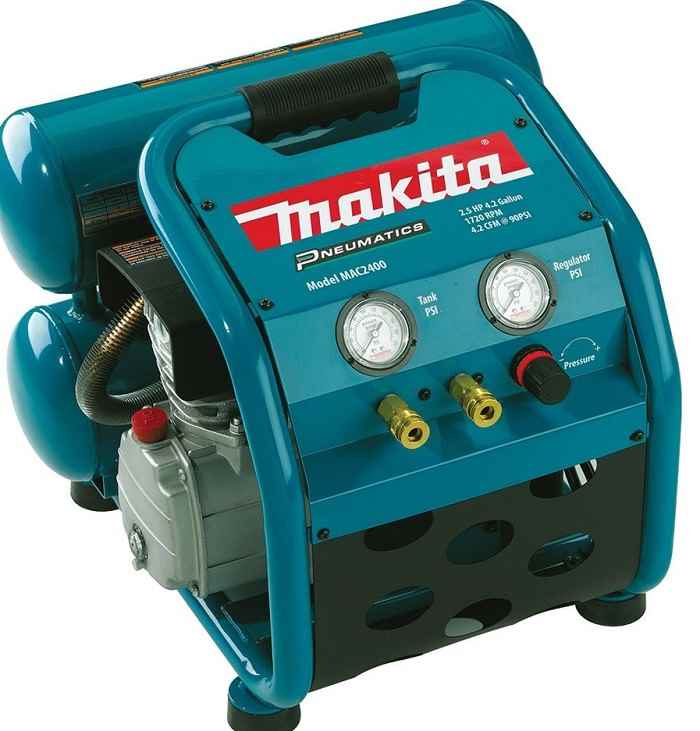
Like the MAC700, the Makita MAC2400 is another Makita air compressor that comes equipped with a big bore pump, practically meant to make the recovery process quick when the tank losses pressure.
The Makita MAC2400 is oil lubricated and also runs at a lower RPM compared to similar sized units. The lower RPM coupled with the fact that it is oil lubricated and it’s made of durable cast iron reduces the wear and tear in the pump, ensuring that you get many years of service from the machine.
Here are the specs:
Gallon Size: 4.2, Running Horsepower: 2.5 HP, Max Pressure: 130 PSI, CFM @90 PSI: 4.2, Lubrication Type: Oiled, Weight: 77 lbs.
What I Like About It
Cons
4. Metabo HPT EC914S 6 Gallon Air Compressor – Best Portable Unit

Metabo nickname this “The Tank” and I see the reason why. Most of the other 6 gallon air compressors I’ve seen produces a maximum pressure that range between 150 and 170 PSI.
The Metabo HPT EC914S however produces a maximum pressure of 200 PSI. That’s a lot, and because of that, it runs better because the pneumatic tools you power with it will run better.
It will run 2 framing or 2 roofing nailers simultaneously with no issue, and you can even run more finish nailers. You can inflate tires with it, even big heavy truck tires with high pressure capacity, and you can carry out small scale spray painting projects.
Another reason why I think they nicknamed it the tank is that, for its size, this thing is quite heavy. That tells me one thing, that the tank is thick and built with good quality still. It’s not some junk that will breakdown so easily.
In terms of portability, I think you can take this with you on any job. There’s an all metal handle at the top to carry it easily with one hand. If you’re a trucker, you can just keep it in your truck in case you need to inflate your car tires.
Here are the specs:
Gallon Size: 8, Running Horsepower: 1.3 HP, Max Pressure: 200 PSI, CFM @90 PSI: 4, Lubrication Type: Oil-free, Weight: 41 lbs.
What I Like About It
Cons
It’s very noisy, especially when used indoors.
Related: 7 Best Air Needle Scalers For Metal Surface Preparation
5. California Air Tools 8010A
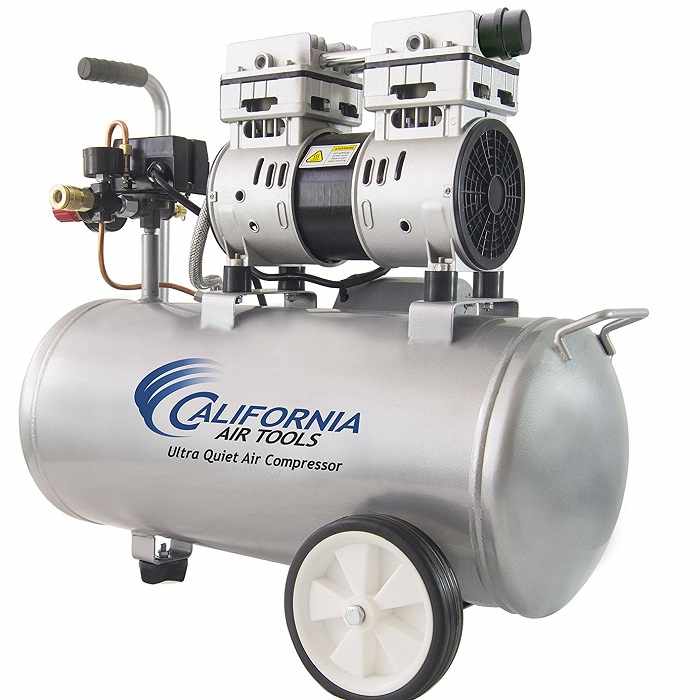
If you want to buy a really quiet air compressor, the California Air Tools 8010A is one of the first unit we’d recommend.
It’s an oil-free model, but it’s quieter than some of the oil lubricated ones I’ve seen.
The tank fills up quickly in less than 3 minutes and recovers in less than 30 seconds when the pressure falls down during use.
Overall, it’s a really good unit you can use on the jobsite on the jobsite and in your home garage to power tools like finish and framing nailers.
Here are the specs:
Gallon Size: 8, Running Horsepower: 1HP, Max Pressure: 135 PSI, CFM @90 PSI: 2.2, Lubrication Type: Oil-free, Weight: 48 lbs.
What I Like About It
Cons
6. Craftsman CMXECXA0331042 10 Gallon Air Compressor
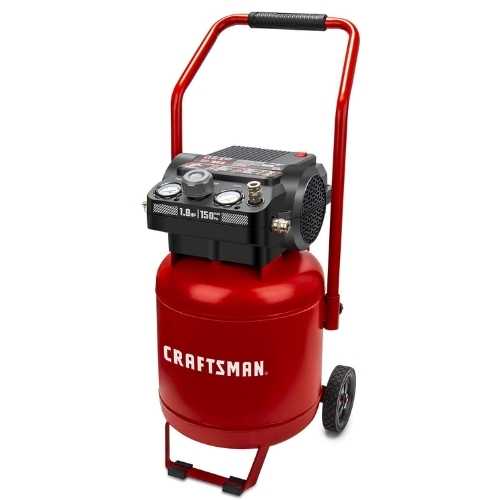
If you want a suitable and reliable 10 gallon air compressor you can use to operate pneumatic tools like nailers, simple DIY paint sprayer, chisels, air hammers and so on, then you should definitely check out this Craftsman model CMXECXA0331042.
It comes equipped with a powerful 1.8 Horsepower induction motor coupled with an efficient and durable pump to fill up the 10 gallon tank.
The tank fills up from zero to full in just 3 minutes, reducing downtime and thus speeding up your work.
It produces a maximum pressure of 150 PSI and a flow rate of 4.0 cfm at 90 PSI, making it suitable for a variety of pneumatic tools.
Equipped with 2 quick connect couplers, two tools can be connected at the same time, allowing up to two people to use it simultaneously or prevent you from having to remove and replace tools constantly.
There are gauges that measures the tank pressure and the tool pressure at the same time. And talking about the tank pressure, there’s a built-in safe valve that leaks out air once the maximum pressure has been attained, thus preventing you from overfilling the tank.
For easy mobility, the Craftsman CMXECXA0331042 comes equipped with two 8 inch no-flat tires and an upright handle to help move it through rough jobsite terrain, and also a rubber feet to keep it standing and stable during operation.
Here are the specs:
Gallon Size: 10, Running Horsepower: 1.8HP, Max Pressure: 150 PSI, CFM @90 PSI: 4, Lubrication Type: Oil-free, Weight: 65 lbs.
What I Like About It
Cons
7. Stealth SAQ-12018 – Best for Jobsite

The Stealth SAQ-12018 features a 20 gallon vertical stand hotdog tank with rubber reinforced wheels for easy mobility.
It takes just 1 minute and 10 seconds to recharge or refill the 20 gallon tank of the Stealth SAQ-12018 air compressor from empty to full, which really reduces downtime and ensures continuity of your work.
Equipped with a 1.8 horsepower high quality induction motor powering an oil-free dual piston pump, you get a high performance machine that produces compressed air on demand.
The dual piston pump used here is relatively quiet compared to other units, producing a working noise of just 68 decibels.
It produces air at a maximum pressure of 150 PSI, and air volume of 6 CFM at 40 PSI and 5 CFM at 90 PSI, allowing users to power air tools such as nail guns, grinders, impact wrenches, sanders, hammer drill and so on.
Whether you’re using it in a warm or cold environment, it will start up every time, even when the voltage is low.
Here are the specs:
Gallon Size: 20, Running Horsepower: 1.8HP, Max Pressure: 150 PSI, CFM @90 PSI: 5, Lubrication Type: Oil-free, Weight: 121.4 lbs.
What I Like About It
Cons
8. Ingersoll Rand SS5 60 Gallon Single Stage Air Compressor
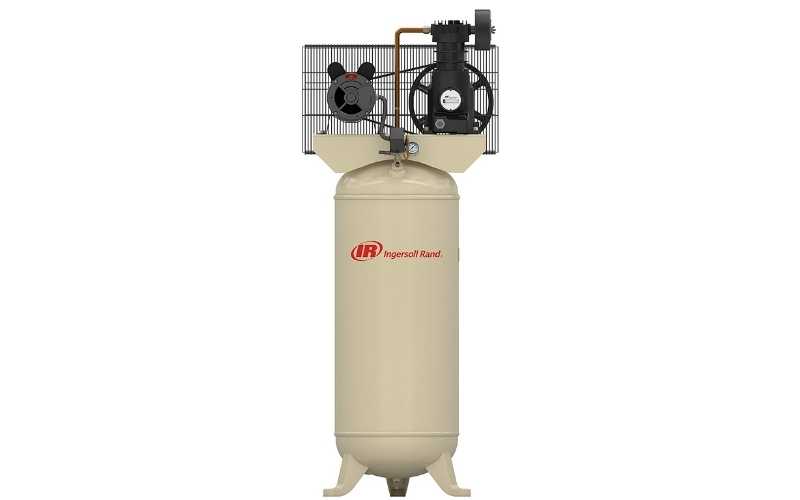
A 60 gallon air compressor like this Ingersoll Rand SS5 comes in very handy if you run an auto workshop or fabrication workshop, because of the volume of air it can store – 60 gallons.
With it you can power impact wrenches, ratchets, grinders, sanders and even paint sprayers and it will hold up well and keep up with the tools.
It’s a single stage runs at 230 Volts with a running horsepower rating of 5HP. It delivers 18.1 CFM of air at 90 PSI which is more than enough for most pneumatic tools. It also means your tools with lower CFM ratings will continue to run even if the unit is recharging.
In terms of performance, the Ingersoll Rand SS5 works really well. You just have to wire it right and connect your air tools and it will fire them up, even the most air demanding ones like die grinders.
You should note that this is a very heavy unit, it’s recommended that you bolt it to the ground to prevent it from tipping over and getting damage or even causing injury to anyone around it.
Here are the specs:
Gallon Size: 60, Running Horsepower: 5HP, Max Pressure: 135 PSI, CFM @90 PSI: 18.1, Lubrication Type: Oiled, Weight: 310 lbs. Operating Voltage: 230V.
What I Like About It
Cons
9. Quincy QT-54 Splash Lubricated Reciprocating 60 Gallon Air Compressor – Best For Workshop Use

The US made Quincy QT-54 is one of the most reliable and well-built 60 gallon air compressor I have reviewed.
It comes equipped with a single phase motor coupled with a 2 stage cast iron belt drive pump which produces up to a maximum pressure of 175 PSI in the reinforced cast iron vertical tank.
The pump life is rated for 30,000 hours which is quite impressive, but I’m quite sure you can get it to last more than that depending on how well you use it.
It has a CFM of 15.4 at 90 PSI, which makes it suitable for powering air-hungry pneumatic tools used in auto workshops like impact wrenches, grinders, and paint sprayers.
Obviously, this is a stationary machine that doesn’t come with tires or wheels. It has a 60 gallon tank which means it’s very heavy weighing up to 475 lbs. and needs to be bolted to the flow to keep it from travelling during operation.
The Quincy QT-54 is designed for efficiency, as it’s splash lubricated and runs at a lower RPM to ensure it runs cooler and at a reduced wear.
Here are the specs:
Gallon Size: 60, Running Horsepower: 5HP, Max Pressure: 175 PSI, CFM @90 PSI: 15.4, Lubrication Type: Oiled, Weight: 475 lbs. Operating Voltage: 230V.
What I Like About It
Cons

